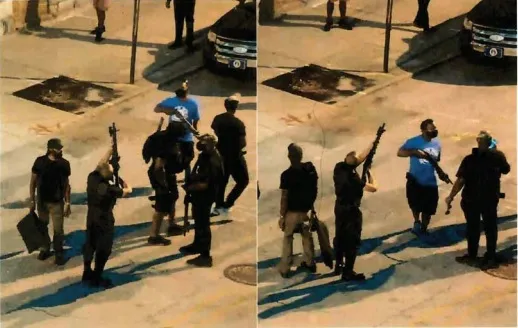It was an incident in Louisville one night in September 2020 that lasted scarcely eight seconds: all-black militia leader John Johnson exited his vehicle, turned on a flashlight attached to his AR-15 rifle, and scanned a downtown rooftop before walking to a nearby park to peacefully protest the murder of Breonna Taylor.
On Wednesday, Johnson is set to be sentenced for this, facing up to 20 years imprisonment for his actions.
That’s because, unbeknownst to the former leader of the “Not Fucking Around Coalition” (NFAC), there were law enforcement officers surveilling protestors from the rooftop he scanned with his tactical flashlight. As the Libertarian Institute previously chronicled, one of the officers was detailed to the FBI, and a U.S. attorney decided to make a federal case against Johnson—painting him as a potential cop killer, even though the feds waited three months after Johnson’s alleged threat to arrest him.
Johnson spoke to The Libertarian Institute ahead of his sentencing from Oldham County Detention Center, where he has been residing in solitary confinement since his conviction in May.
“With high-profile inmates, they tend to keep them separate from general population for their own protection sometimes, and sometimes just because they don’t want to have to bear the responsibility if anything happens to that person,” Johnson said of his confinement. “I am being treated as any other inmate would be treated—three hots and a cot, and whatever other liberties are extended to the other inmates are also being extended to me.”
With motions for retrial and acquittal pending before a federal judge, Johnson expressed optimism about his situation, saying he still has faith in the justice system that put him behind bars. He is no longer the commander of NFAC. “The NFAC insists on law-abiding citizens,” he said of the militia. But has plans to keep advocating for justice for Taylor and those arrested protesting her murder.
“Will I continue to speak out against injustice? Will I continue to exercise my first amendment rights to free speech? Of course I will. Will I advocate for anything illegal or any type of overthrow of government? I never have and I never will,” he said, adding, “I do not think being incarcerated means I should be silenced.”
Johnson has admitted that pointing his rifle at the rooftop was a mistake, as have other gun rights activists. “All things considered, it sounds like he’s lucky [the cops] didn’t light him up,” commented David Codrea, who runs the blog The War on Guns. “Why this is a federal case is another matter altogether.”
Why, indeed? From the U.S. government’s standpoint, the consequences of Johnson’s prosecution have been beneficial. The NFAC has been largely inactive since his arrest; and meanwhile, the U.S. attorney who spearheaded the case, Russell Coleman, now has his sights on being Kentucky’s next attorney general.
“Ignorance of the law is no excuse,” Johnson said of his situation. “At the same time, we must realize there are people who may weaponize the legal system; weaponize the judicial system for their own personal advantages or agendas.”
Johnson said his message for protestors and activists is to continue operating within the confines of the law, but to realize that the powers at be might still target them anyway.
“None of us are perfect. If someone digs deep enough, they can probably find a law on the books to say you did something wrong. We have to learn that hypocrisy exists within the world,” he said. “What one person gets a slap on the hand for, another may get the entire encyclopedia thrown at them.”








